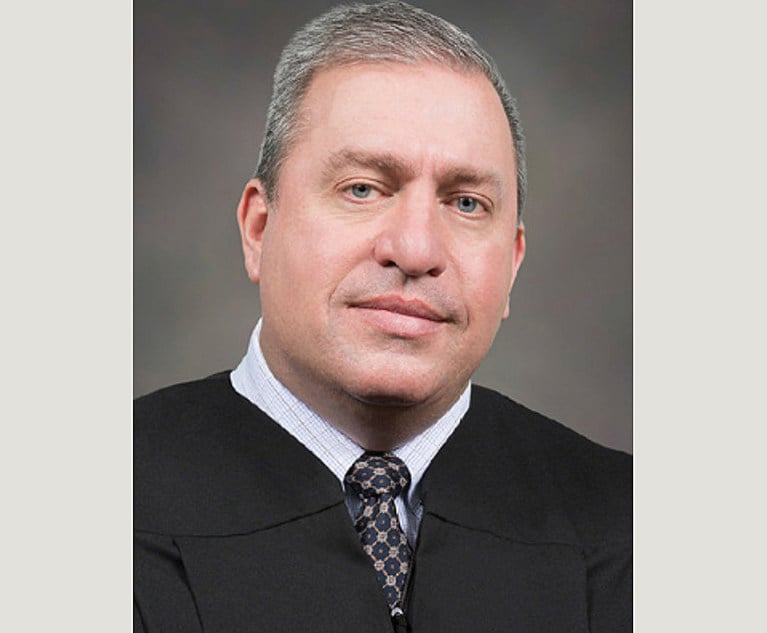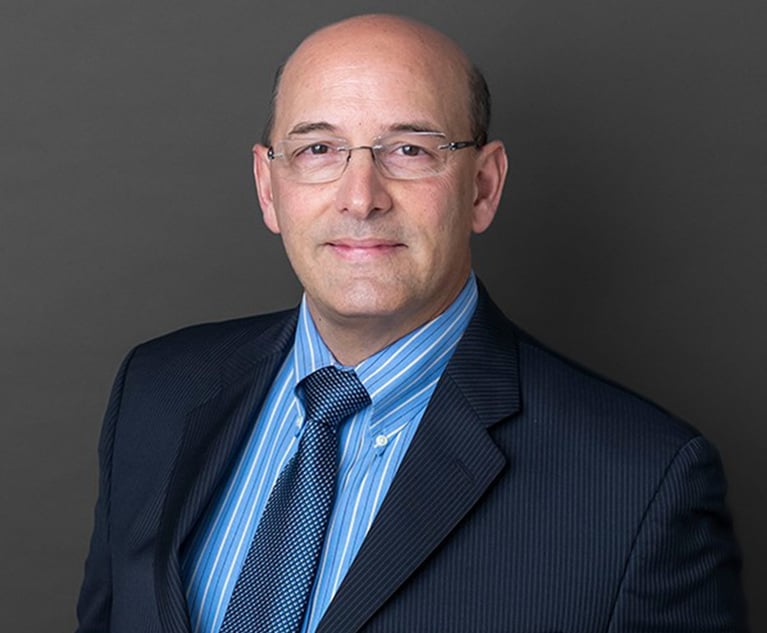 Photo: Gabrielle Purchon
Photo: Gabrielle Purchon3rd Circuit Won't Let JPMorgan Avoid FINRA Arbitration Based on Forum Selection Clause
The Third Circuit has ruled that JPMorgan & Co. can't use a forum selection clause to avoid its obligation as a member of the Financial Industry Regulatory Authority to arbitrate all claims brought against it by a client.
August 09, 2018 at 05:08 PM
5 minute read
The U.S. Court of Appeals for the Third Circuit has ruled that JPMorgan & Co. can't use a forum selection clause to avoid its obligation as a member of the Financial Industry Regulatory Authority to arbitrate all claims brought against it by a client.
The appeals court, affirming a ruling from the U.S. District Court for the Eastern District of Pennsylvania, said a forum selection clause in broker-dealer agreements issued by Bear Stearns, now JPMorgan Securities, is insufficient to waive Reading Health System's right to arbitration under FINRA's Rule 12200.
The Aug. 7 ruling also contributes to a split on the FINRA arbitration issue with the Second and Ninth circuits, which, under similar circumstances, have upheld forum selection clauses as arbitration waivers. The Second Circuit decision, in 2014, was Goldman, Sachs & Co. v. Golden Empire Schools Financing Authority, which also concerned a dispute over an issue of auction rate securities. In the Ninth Circuit, the case was Goldman, Sachs & Co. v. City of Reno.
The Third Circuit's decision instead follows a decision by the Fourth Circuit, which said forum selection clauses in the broker-dealer agreements are insufficient to waive the client's right to arbitrate under FINRA. In that decision from 2013, UBS Financial Services v. Carilion Clinic, the appeals court rejected the notion that a forum selection clause could act to waive the client's right to arbitrate under FINRA Rule 12200.
According to the Third Circuit opinion, when Reading Health executed a series of agreements with Bear Stearns related to offerings of auction rate securities through which it issued more than $500 million in debt, some of the contracts included a forum selection clause calling for all actions and proceedings arising out of the agreements to be adjudicated in the Southern District of New York.
After the market for auction rate securities collapsed, Reading filed a claim with FINRA, accusing JPMorgan of unlawful conduct and seeking to resolve the claims through FINRA arbitration. Reading claims that JPMorgan and other broker-dealers artificially propped up the ARS market by creating a false appearance of market demand for such securities.
JPMorgan refused the request for arbitration, citing its forum selection clauses. Reading then filed a declaratory judgment action in the Eastern District of Pennsylvania to compel FINRA arbitration.
JPMorgan sought to move that action to the New York, again citing its forum selection clauses. U.S. District Judge Lawrence Stengel of the Eastern District of Pennsylvania denied JPMorgan's motion to transfer the case and ordered it to submit to FINRA arbitration.
On appeal, Third Circuit Judges Patty Shwartz and Jane Roth, along with Eastern District Judge Gerald Pappert, sitting by designation, affirmed Stengel's ruling.
Roth, writing for the panel, said a waiver must be more specific than those signed by Reading Health System in order to supersede the obligation to arbitrate under FINRA Rule 12200. And the strong federal policy in favor of arbitration, embodied by the Federal Arbitration Act, dictates that any situation where arbitrability is in question should be decided in favor of arbitration, the court said.
A party signing a waiver must know what rights it is waiving, Roth wrote for the court.
“Any reference to arbitration is conspicuously absent from the forum selection clauses [signed by Reading Health System]. Without a specific reference to arbitration, the forum selection clause … lacks the specificity required to advise Reading that it was waiving its affirmative right to arbitrate under FINRA 12200,” Roth wrote.
Roth said the Ninth Circuit, treating Rule 12200 as a “default obligation” to arbitrate, reasoned in City of Reno that the customer “clearly and unambiguously disclaimed any right it might otherwise have had to FINRA arbitration” when it agreed to the forum selection clause. Similarly, the Second Circuit, in Golden Empire, viewing the issue as “whether an arbitration agreement remains in force in light of a later-executed agreement,” found the forum selection clause superseded the FINRA arbitration rule, Roth noted.
But the Fourth Circuit, in Carilion Clinic, rejected the notion that the forum selection clause could serve to waive a customer's right to arbitrate under FINRA Rule 12200. In that case, the court began with the principle that an agreement “waives the right to arbitrate only if it is sufficiently specific to impute to the contracting parties the reasonable expectation that they are superseding, displacing or waiving the arbitration obligation created by FINRA Rule 12200,” Roth wrote for the court.
“We agree with the Fourth Circuit that the question is one of waiver, and that the forum-selection clauses did not implicitly waive Reading's right to FINRA arbitration,” Roth wrote.
Mark Strauss of Kirby McInerney in New York, who represented Reading Health System, said that the decision “establishes that the industry can't force clients out of arbitration through the ruse of inserting cryptic supposed waiver clauses in their contracts which they can then decide to invoke whenever it suits them.”
Strauss said he doesn't expect a petition for en banc review would be granted, and a petition for certiorari to the Supreme Court “would be futile because, despite the circuit split in outcomes, the ruling turned on mere contract interpretation,” he said
Jonathan Youngwood of Simpson Thacher & Bartlett in New York, who represented JPMorgan, did not return a call seeking comment.
This content has been archived. It is available through our partners, LexisNexis® and Bloomberg Law.
To view this content, please continue to their sites.
Not a Lexis Subscriber?
Subscribe Now
Not a Bloomberg Law Subscriber?
Subscribe Now
NOT FOR REPRINT
© 2024 ALM Global, LLC, All Rights Reserved. Request academic re-use from www.copyright.com. All other uses, submit a request to [email protected]. For more information visit Asset & Logo Licensing.
You Might Like
View All
Pa. High Court to Weigh Parent Company's Liability for Dissolved Subsidiary's Conduct
3 minute read
Pa. Supreme Court Taps New Philadelphia Family Division Administrative Judge
3 minute read
People in the News—Nov. 27, 2024—Flaster Greenberg, Tucker Arensberg
3 minute read
Trending Stories
Who Got The Work
Michael G. Bongiorno, Andrew Scott Dulberg and Elizabeth E. Driscoll from Wilmer Cutler Pickering Hale and Dorr have stepped in to represent Symbotic Inc., an A.I.-enabled technology platform that focuses on increasing supply chain efficiency, and other defendants in a pending shareholder derivative lawsuit. The case, filed Oct. 2 in Massachusetts District Court by the Brown Law Firm on behalf of Stephen Austen, accuses certain officers and directors of misleading investors in regard to Symbotic's potential for margin growth by failing to disclose that the company was not equipped to timely deploy its systems or manage expenses through project delays. The case, assigned to U.S. District Judge Nathaniel M. Gorton, is 1:24-cv-12522, Austen v. Cohen et al.
Who Got The Work
Edmund Polubinski and Marie Killmond of Davis Polk & Wardwell have entered appearances for data platform software development company MongoDB and other defendants in a pending shareholder derivative lawsuit. The action, filed Oct. 7 in New York Southern District Court by the Brown Law Firm, accuses the company's directors and/or officers of falsely expressing confidence in the company’s restructuring of its sales incentive plan and downplaying the severity of decreases in its upfront commitments. The case is 1:24-cv-07594, Roy v. Ittycheria et al.
Who Got The Work
Amy O. Bruchs and Kurt F. Ellison of Michael Best & Friedrich have entered appearances for Epic Systems Corp. in a pending employment discrimination lawsuit. The suit was filed Sept. 7 in Wisconsin Western District Court by Levine Eisberner LLC and Siri & Glimstad on behalf of a project manager who claims that he was wrongfully terminated after applying for a religious exemption to the defendant's COVID-19 vaccine mandate. The case, assigned to U.S. Magistrate Judge Anita Marie Boor, is 3:24-cv-00630, Secker, Nathan v. Epic Systems Corporation.
Who Got The Work
David X. Sullivan, Thomas J. Finn and Gregory A. Hall from McCarter & English have entered appearances for Sunrun Installation Services in a pending civil rights lawsuit. The complaint was filed Sept. 4 in Connecticut District Court by attorney Robert M. Berke on behalf of former employee George Edward Steins, who was arrested and charged with employing an unregistered home improvement salesperson. The complaint alleges that had Sunrun informed the Connecticut Department of Consumer Protection that the plaintiff's employment had ended in 2017 and that he no longer held Sunrun's home improvement contractor license, he would not have been hit with charges, which were dismissed in May 2024. The case, assigned to U.S. District Judge Jeffrey A. Meyer, is 3:24-cv-01423, Steins v. Sunrun, Inc. et al.
Who Got The Work
Greenberg Traurig shareholder Joshua L. Raskin has entered an appearance for boohoo.com UK Ltd. in a pending patent infringement lawsuit. The suit, filed Sept. 3 in Texas Eastern District Court by Rozier Hardt McDonough on behalf of Alto Dynamics, asserts five patents related to an online shopping platform. The case, assigned to U.S. District Judge Rodney Gilstrap, is 2:24-cv-00719, Alto Dynamics, LLC v. boohoo.com UK Limited.
Featured Firms
Law Offices of Gary Martin Hays & Associates, P.C.
(470) 294-1674
Law Offices of Mark E. Salomone
(857) 444-6468
Smith & Hassler
(713) 739-1250





